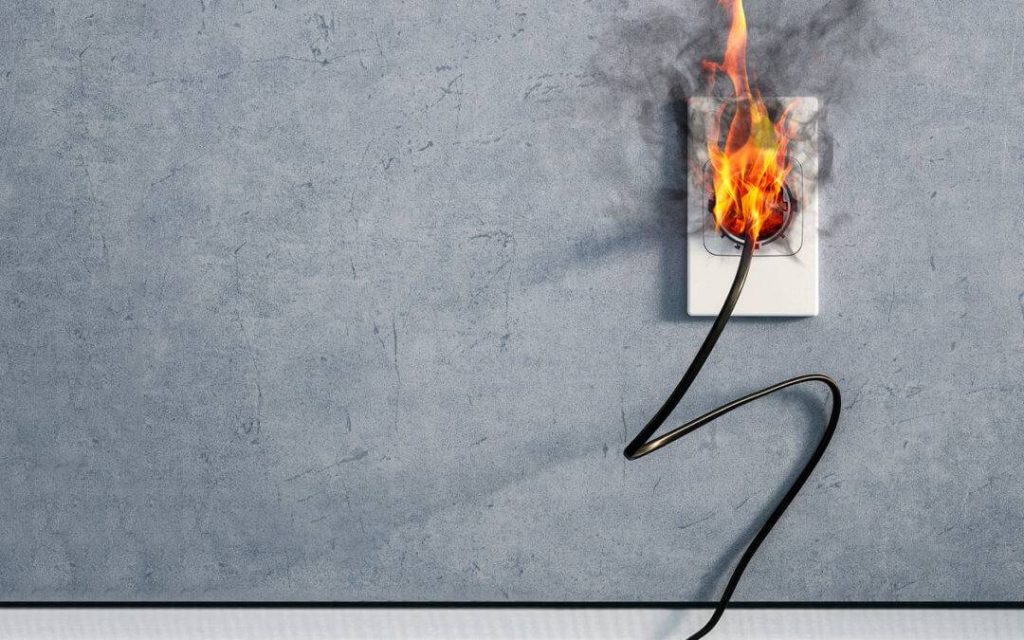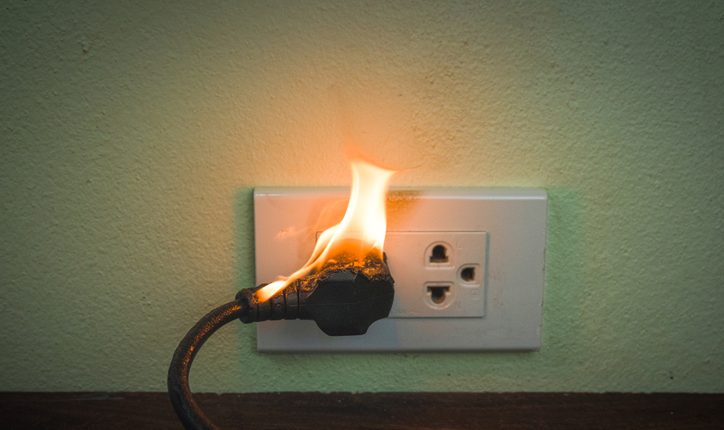Yearly, around 51,000 house fires are caused by electrical fires. Do you believe your home is secure? The best method to ensure your safety is to learn the hazards and origins of electrical fires.
What causes electrical fires? All it takes is a single spark or a lot of heat. The following are some of the most common causes of electrical fires.
Circuit Overload
Connecting too many wires to a single-phase supply is a problem waiting to happen. Using the same extension cord to power many devices and gadgets at the same time is not a good idea. Overloading the circuit will cause the system to break down and maybe cause a fire.
Rather than depending on extension cables, try using numerous outlets and making sure your appliances are on a separate circuit. Hire an electrician to add more outlets or separate circuits to your home if you don’t have enough.
Old Wiring
What is the age of your house? Wiring in homes built more than two decades ago is likely to be outdated. Consequently, old wiring is one of the primary causes of house fires. You may observe repeated circuit breaker overloads, power outages, or other indicators of faulty wiring because it lacks the potential to fill the needs of current technologies and energy use.
Hire a certified electrician to evaluate and replace any outdated or faulty wiring in your home as a fire prevention strategy.
Space Heaters
House fires have a negative impression when it comes to space heaters. These heaters heat up very quickly and can easily ignite flammable objects. A portable heater placed too close to drapes, bedding, or furniture could cause a fire.
Place portable heaters away from flammable items and store them on level, fire-safe surfaces for an appropriate method of fire prevention. Always keep an eye on a space heater and disconnect it while it’s not in use.
Placing clothes directly onto a running space heater is a frequent practice, particularly in cooler regions, to dry wet garments quickly or warm up chilly clothing quicker. This can result in a major fire hazard, notably if the garment is kept on the heat source for a lengthy period of time.
If you frequently use a portable heater, ensure you have one that is up to date and has the newest electrical fire-prevention features. Furthermore, using a machine that is built for a smaller area than you are using it in may cause it to overheat repeatedly, increasing the risk of fire and shortening the unit’s operational lifespan.
Old Appliances
That 1960s toaster may be fascinating to look at, but it’s definitely not safe to be using. When it comes to materials, structure, and safety laws, older appliances do not meet today’s standards. Moreover, frayed wires and loose wiring are more common in old equipment.
Inspection of appliances for symptoms of electrical damage is a good fire prevention strategy. An appliance repair specialist should evaluate any electrical items that make weird noises or emit a burning odor. Replace any broken appliances with newer products that meet current safety requirements.
For whatever reason, you could have a few gadgets that must be hooked in at all times. Nonetheless, if you can disconnect anything while it’s not in use, you’ll be able to reduce the amount of strain on your power sockets significantly.
Stoves, toasters, microwaves, and other similar appliances that aren’t working properly can reach unsafe levels and start to spark. This is exceedingly hazardous, particularly if combustible materials are present. Keep a constant check on the temps of your kitchen appliances and the condition of your kitchen outlets.
Faulty Outlets
Did you know that the majority of electrical fires begin in outlets? Ungrounded outlets are more prone to catch fire, spark, or generate an electrical arc. If somehow the wiring behind them loosens, even grounded outlets might cause a fire. In the case of a short, GFCI outlets can assist prevent fires by interrupting the circuit.
Regularly inspect outlets as a fire prevention strategy. Examine the sockets and switches for wear and tear, such as soot. If the wires are slack, they should be tightened to reduce the risk of a fire. When it comes to outlet improvements or major electrical repairs, always hire a professional electrician.
Light Fixtures
It’s not like all light bulbs are compatible with all light fixtures. A common cause of electrical fires is using a high-wattage bulb in an unsuitable lamp. A fire could start if you cover the lamp with an improvised cloth lampshade.
Double-check the voltage before replacing old light bulbs as a fire prevention strategy. It’s necessary to replace a light fixture that becomes too hot while in use. Use only commercial lampshades that are specifically designed to fit the form and size of your light fixture.
Tips For Keeping Your Home And Family Safe In Case Of A Fire
Even though you implement all of the safety procedures and rules, electrical fires cannot always be avoided. Prepare to defend your family if one breaks out. Here are some tips from an electrician on how to be safe:
- Check to see if your power system is up to standard and safe to operate. Upgrades to GFCI outlets, upgrading an outdated electrical panel, repairing old wiring, and other tasks may be required.
- Install smoke detectors in every room of your home. Battery testing and replacement should be done on a regular basis.
- Get yourself a fire extinguisher. Water won’t put out an electrical fire, and it can even make things worse. Find a suitable fire extinguisher that is rated class C or ABC.
- Electronics can never be used with frayed, damaged, or crimped wires. They have the potential to spark and ignite.
Let The Professionals At TheFlashElectric Help
Let’s not let your home be destroyed by an electrical fire that could have been avoided. By doing a professional electrical examination, we will be able to discover and resolve electrical-related issues. To keep your house protected from an electrical fire, make an appointment online or give us a call.
Make sure to check us out at the following link for more information:





